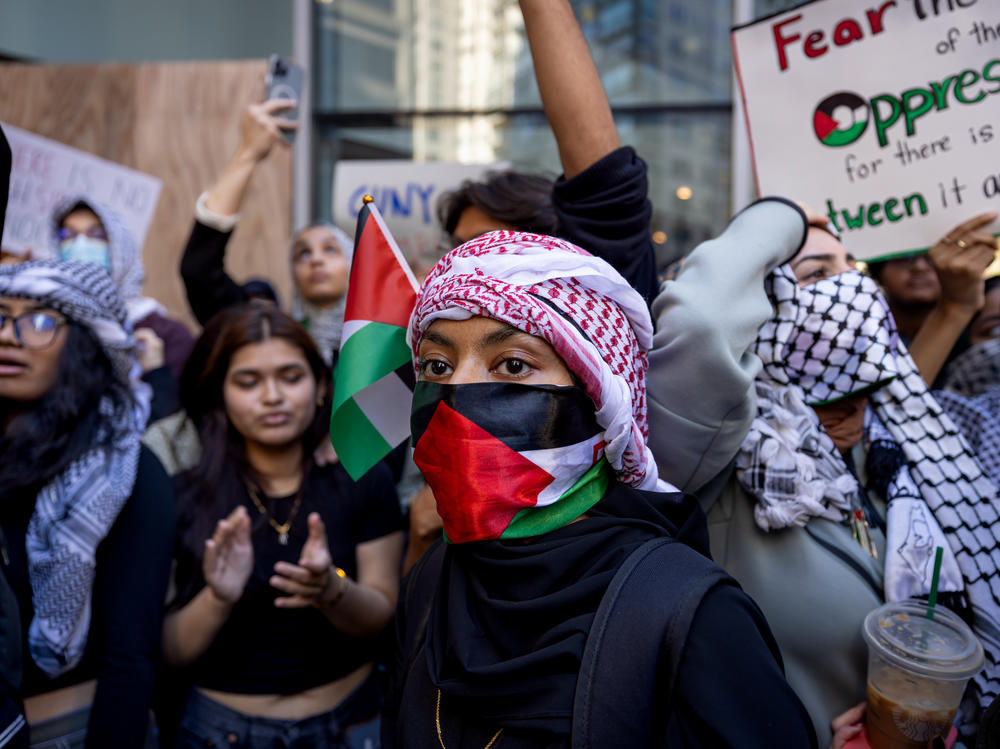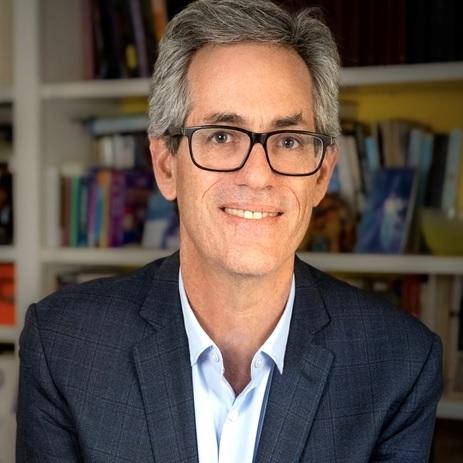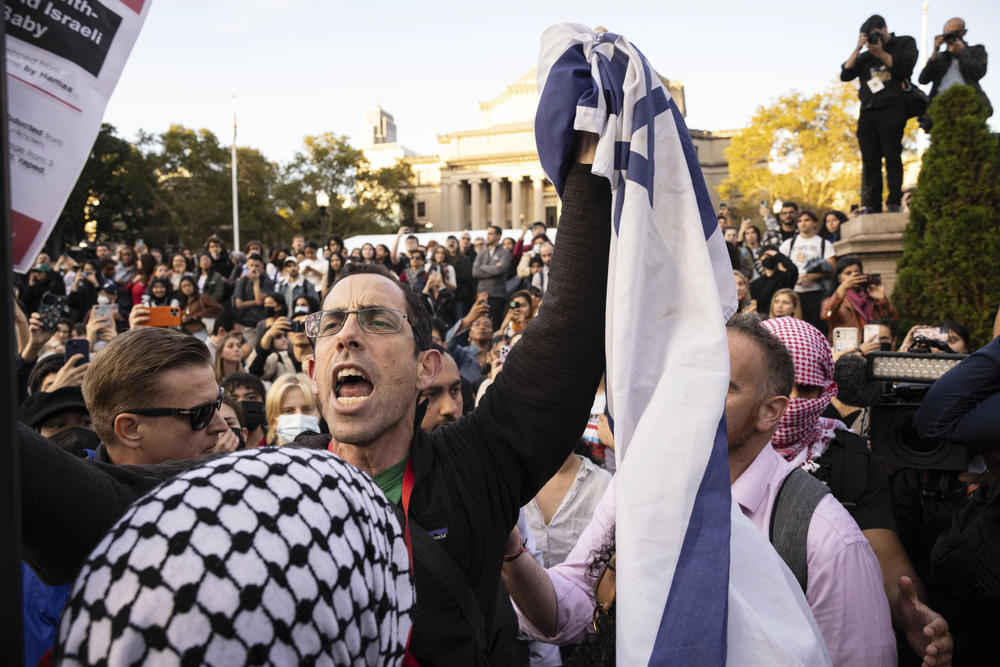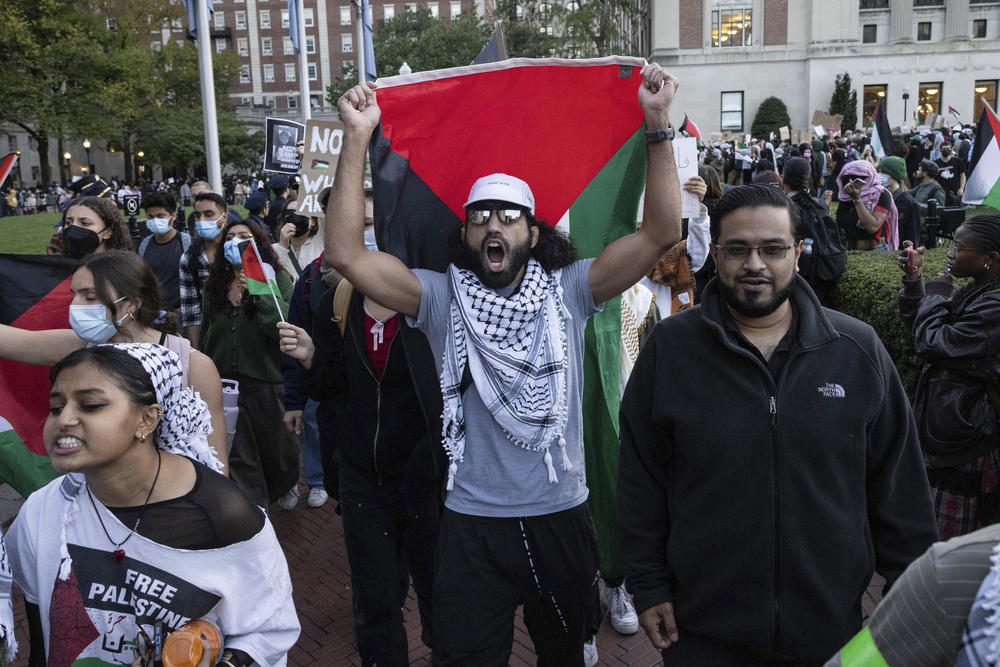Section Branding
Header Content
His call for empathy has made this Jewish studies professor feel isolated
Primary Content
There's a particular feeling of uselessness that can take hold when you are watching a horrible thing happen far away from your home — but that same thing is causing your friends and neighbors deep pain.
The war in Israel and Gaza has created this web of shared grief connecting friends and strangers. In the days right after the Hamas attack, my neighbor was worried about her extended family in Israel who she was having a hard time tracking down.
Another Jewish friend has been working through her own grief, albeit from a distance — one of the women in her broader friend network lost two nieces. One was killed by Hamas, the other is missing.
My husband's best friend is Palestinian American. He and I texted this week. I didn't know what to say, but just said I was thinking of him. He wrote back, and told me some colleagues of his in Gaza are missing. "Amazing, thoughtful, very-much-not-Hamas people," he said. "Gaza is just unbearable ... I can't stop watching it and I can't watch it."
I am not Jewish or Palestinian. This is not my grief in the same way it is for those whose people's very existence is at stake. I'm supposed to come up with a conversation that makes us all feel connected — that inspires some kind of hope. But there is no easy spiritual salve for these horrors. There is no single conversation that can represent the pain accumulated over generations in this existential struggle over land and God and who does and does not get to see their children grow up.
Yet I happened upon an op-ed by a professor of Jewish history at UCLA. His name is David Myers. He wrote for the campus paper, trying to stake out some middle ground, where Jews and Palestinians on campus could safely stand and grieve for one another.
I felt like there was hope in that idea, so I reached out to see if he'd be willing to talk. I also craved a long view. A historian's take. Because perhaps, with distance, the pain is lessened? It became clear very quickly that historians fix their gaze in the past, but they live with us here, now, in this present moment, and it can be too much to bear.
This interview has been edited for length and clarity.
Rachel Martin: How are you doing?
David Myers: Terribly. My heart is broken. I'm grieving, mourning, angry, bewildered, scared — all of those things. And I realize I'm not there. I'm not in Israel-Palestine. I'm at a remove. So what must it be to be there on the ground? And I do spend a lot of time there, but I'm not there now and I'm feeling all of these things and it's almost unbearable. I spend my time teaching, doing media appearances, and then disappearing back into a cave of depression.
Martin: How did things start to evolve on campus? Because UCLA, like many college campuses around the country, has been beset with a lot of students who are angry, who are hurt, who are suffering, who want justice for all the people who've lost their lives. How did you see all of that emotion start to manifest and bubble up?
Myers: I first came into contact with the deep sorrow and grief of Jewish students who were just in a state of shock. Some students whom I've taught in the past, including a class on Israel-Palestine. I've taught with a Palestinian American colleague of mine at Tufts University, and I connected with them to hear how they were doing, and they were in a state of complete shock.
Martin: What kinds of questions were you getting in the classroom?
Myers: I think what I encountered was a great deal of mystification about how students on the other side of the divide failed to understand where they were. It was much less about, "Can you help me understand what took place in geopolitical terms?" and more about, "How could that group be so uncomprehending and so lacking in basic empathy?"
Martin: So you immediately started to feel an us versus them tension?
Myers: I did. Both groups, and I'm sort of generalizing and speaking of these groups, the groups represent those strong supporters of Israel who tend to be Jewish students, and supporters of the Palestinian cause, some of whom are Palestinian and Arab and many of whom are not.
I think both bear within them a deep sense of grievance. The Jewish students or the pro-Israel students feel like the progressive left, with whom they have natural solidarity on many other issues, refused to condemn unequivocally a massacre of Jews. And those who support the Palestinian cause believe that the university and the broader political culture of the United States are insufficiently attentive to the suffering of the Palestinian people.
Martin: So in all this, you're dealing with your own grief over the tragedy. You are trying to still be a history professor. You are watching these tensions build among the students on your campus. At what point do you feel a need to write this op-ed?
Myers: What became clear was that I had to write something that made the very simple and intuitive claim that now is the time to recognize the humanity of all. Now is not the time, at least for me, to take sides.
I knew that that would elicit many suggestions that I was a traitor to my people, the Jewish people. And I knew it would elicit many claims that I failed to understand the depth of suffering of the Palestinian people. But I had to write what I had to write. And I believe it's not only intuitive, it's the moral place where I need to be.
Which is to say, it is an absolute moral imperative to condemn without equivocation the massacre that took place on October 7th. And it is a moral imperative to attend to the extraordinary suffering that Palestinians in Gaza are now undergoing, and that the two are not exclusive of one another.
All too often, in the best of circumstances, people feel the need to choose sides. Now, in this environment, it's understandable why people feel they can't hold on to both. But I guess I would ask: Is there not a small portion of our hearts that can be reserved for the other, even in this time of grief?
I don't consider myself to be a morally better person than the average, but I do think it's important to try to in such moments, as a manifestation of our humanity, carve out a small portion that can allow us to empathize.
Martin: As a history teacher, I think part of your job is looking back through time and identifying patterns and teaching students also how to identify them and then to hopefully break the patterns that don't serve us anymore, right? As people, as societies, as humankind. How do you do that in this conflict when the same cycles of violence repeat themselves over and over for generations?
Myers: Yeah. And those cycles are rooted in profound traumas, which in some sense clashed with one another. The trauma of the Holocaust, of course, known to almost all, and the trauma of the Nakba, of the displacement and expulsion of 750,000 Palestinians during the 1948 war. I guess my answer to your question, Rachel, about how we break out of the mold, is to ask ourselves, how's it going? How well is it working? And I think from what we've seen over the last two weeks, it's not working well at all. That kind of death embrace of two siblings, I often think of them as Jacob and Esau, is detrimental to the health of both.
Martin: I wonder where you are finding solace right now.
Myers: It's a very tricky question, in part because I take solace in prayer and in prayer in community. But this is a period in time in which I do not feel in sync with my community and I feel my community does not feel in sync with me. And therefore I feel some measure of what many of us feel at this time, just extraordinary loneliness.
But I also see how, particularly the Psalms, offer sources of consolation. And open up the possibility of moving beyond where we are. And every day we say a verse, which I wrote down, because I carry it with me now. It says: "You turned my lament into dancing. You undid my sackcloth and girded me with joy."
And I have to hope, because there is no alternative, that once again, our lament can turn into dancing.
Copyright 2023 NPR. To see more, visit https://www.npr.org.




